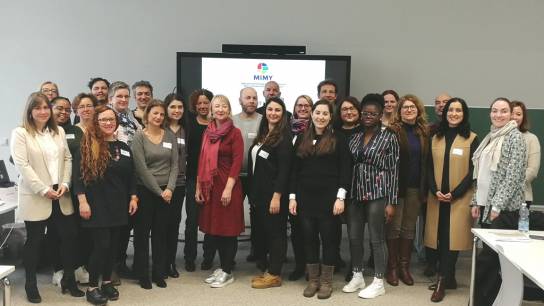The new EU research project MIMY has set out to improve the situation of young migrants in Europe through a multi-level analysis of the related integration processes. Collecting qualitative and quantitative data and conducting case studies in various countries, the interdisciplinary consortium will analyse the social and economic effects of (successful or failed) integration in order to derive evidence-based policy recommendations. Over the next three years, the 12 European partners will receive EUR 3 million funding from the European Union’s Horizon 2020 Framework Programme.
Especially since 2015, migratory flows to Europe have driven EU member states to adopt different national strategies regarding integration efforts and policies. Moreover, in the context of an ageing population and a need for certain professional skills, migrants make an important economic contribution to these countries. Therefore, with young people representing a large proportion of migrants, societies need to find new ways to tackle the challenges arising from integration of young third-country nationals and to avoid social exclusion.
Launched in February 2020, the EU-funded project MIMY addresses these issues by examining the effectiveness of integration policies in a comparative and interdisciplinary research endeavour. The 12 partners from 11 disciplines, such as sociology, cultural and political sciences, economics and psychology, will focus on the dynamic, open-ended process of integration across macro (EU migration policies), meso (regional economic and social systems) and micro (individual practices) level. Aiming to offer tailor-made, actionable policy recommendations, the multi-method approach will provide in-depth analyses of:
- the long-term socio-economic effects of successful and failed integration
- factors fostering or hindering integration processes of young migrants (considering the heterogeneity and diverse biographical backgrounds)
- diverse social actors and institutions supporting the agency of young migrants by further strengthening their resilience and resistance strategies
The experiences of young migrants, which have often been neglected in past examinations, will be put at the centre of the MIMY project. “Taking their needs and expectations into account, we want to contribute to the empowerment of this vulnerable group enabling them to become active citizens within an inclusive society”, said Professor Birte Nienaber from the University of Luxembourg, who coordinates the project. “Directly involving young migrants as peer researchers and through participatory research, we want to actually make their voices heard in the policymaking bubble.”
The MIMY consortium comprises 12 European partners from Belgium, Germany, Hungary, Italy, Luxembourg, Norway, Poland, Romania, Sweden and the UK. On 10-11 February 2020, they come together for the official project kick-off in Luxembourg.

